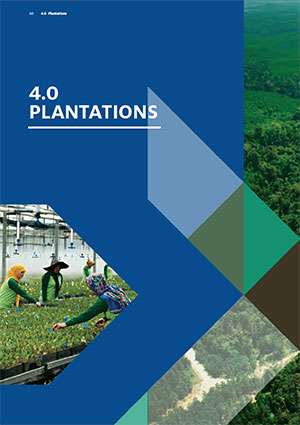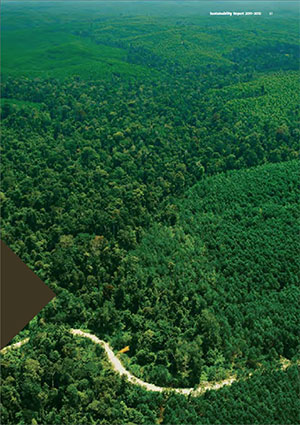APRIL continues to develop its conservation efforts in Riau Province.
In April 2013, a multi-year ecosystem restoration programme involving the establishment of a peat forest reserve on the Kampar Peninsula of Riau Province, on the east coast of Sumatra, was launched by the Indonesian Minister of Forestry Zulkifli Hasan.
The programme, which will restore and protect 20,265 hectares of peat forest as a forest reserve, is showcased at www.rekoforest.org.
The project leader is Restorasi Ekosistem Riau (RER), a new not-for-profit organization. APRIL initiated the establishment of RER and will provide financial and technical assistance.
RER’s programme is being conducted under a 60-year restoration license issued by the Ministry of Forestry. More than US$ 7 million will be invested in the first three years to create an enduring, world-class forest reserve.
RER’s approach involves four main pillars which are described below.
| PROTECT |
Indonesia’s remaining forest areas are facing increasing threats from illegal land clearance for agriculture and human settlement, hunting of wildlife, forest fires and continued drainage of water from peat swamp forests.
RER will adopt appropriate protection strategies that will include the establishment of a formal guard and patrol function and bespoke community resource management and protection schemes. RER will work with its stakeholders to ensure that solutions are practical and effective.
| ASSESS |
Detailed assessments of remote peat swamp forests can be logistically challenging but RER is committed to delivering the time and resources required to understand the ecosystem that is to be protected.
RER will carry out an inventory of the current presence and condition of flora, fauna and wildlife habitats, assisted by expert third-party partners. The restoration zone’s current physical and social environment will be assessed to establish the baseline against which future assessments can be benchmarked. The assessment will include:
- Biogenic carbon and carbon stored within peat soils.
- The water cycle and other components of the physical systems.
- Communities and their relationship with the forest resource, in terms of the frequency and purpose of usage of the forest.
- Biodiversity in terms of the number and distribution of flora and fauna species present
| RESTORE |
The RER zone is not pristine. Certain areas have been degraded by fire, selective harvesting, hunting, fishing and illegal logging.
RER will restore the degraded sites through a process of “restocking”, using seedlings from the surrounding local forest. It will establish a nursery to cultivate native seedlings and carry out a programme of staged replanting. Water level restoration will be conducted in tandem to maintain water levels critical to the health of peat forest ecosystems, and we will continually evaluate the effectiveness of our efforts.
| MANAGE |
With a diverse set of partners, RER possesses the knowledge, expertise and skill sets to carry out the restoration efforts. It also draws on the experience of various partners in the management of High Conservation Value tropical peat forest areas.
RER will develop a comprehensive, long-term management plan with its advisory panel of Indonesian and international specialists. This plan will incorporate the outcome of consultations with local communities, the Indonesian Government and adjacent forest concession licence-holders. It will be disseminated to national government bodies and international interest groups for their feedback. APRIL’s vision is for RER to be the first in a series of eco restorations.

